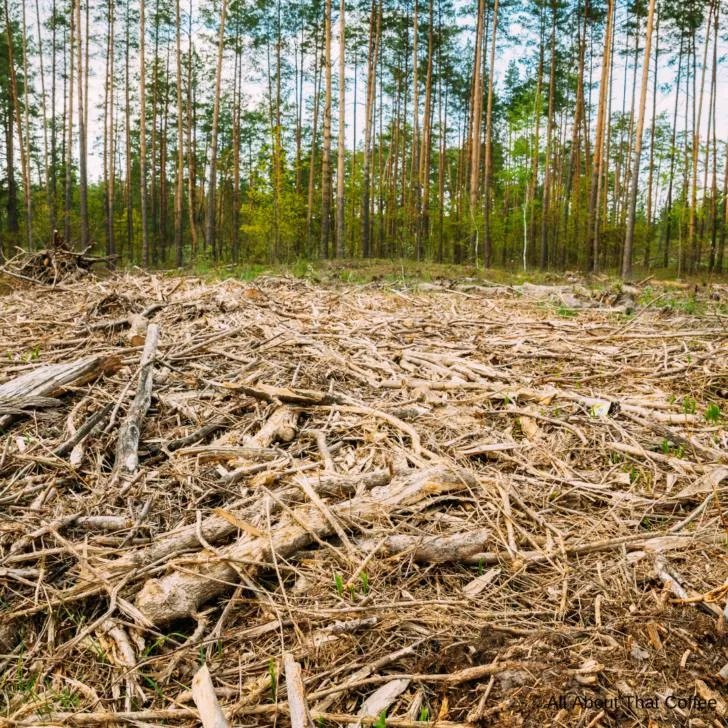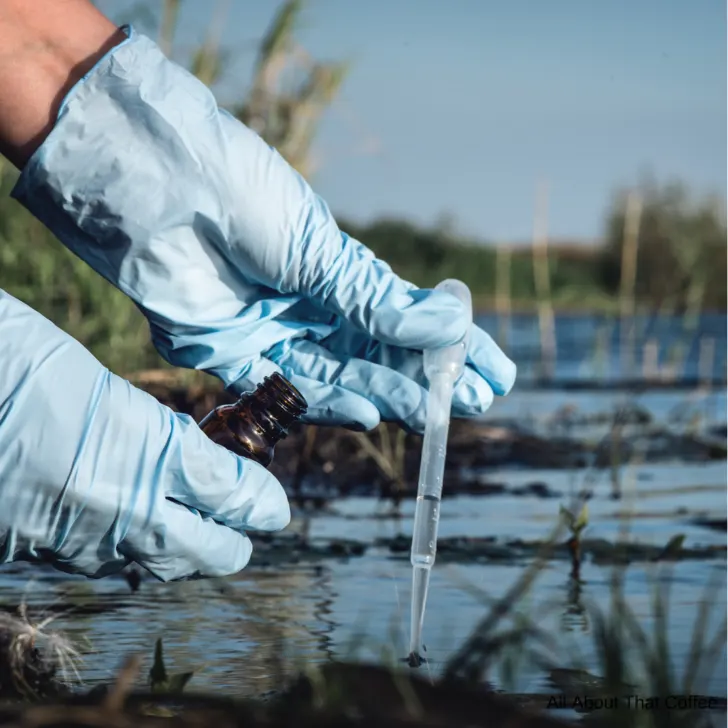Table of Contents
Do you love coffee? Are you concerned about the environment? Have you been searching for sustainable coffee brands?
If so, you’re not alone. In fact, coffee is the most popular drink in the world. And while most people just think about how delicious a cup of coffee can be, there are some who are thinking about the impact that their coffee habits have on the environment.
Sustainable coffee brands are making a difference one cup of coffee at a time by using sustainable practices to produce and sell their coffee.
In this blog post, we will discuss what makes a brand sustainable and highlight some of our favorite sustainable coffee brands!
Sustainable Coffee Practices
Sustainable coffee practices have become increasingly important in recent years as consumers become more aware of the impact that their purchasing decisions can have on the environment and on the communities that produce their coffee.
Coffee is one of the most popular beverages in the world, with an estimated 2.25 billion cups consumed every day.
However, coffee production can have a significant environmental impact, including deforestation, soil erosion, and water pollution.
In addition, coffee farmers often face low wages and poor working conditions.
Sustainable coffee practices aim to address these issues by promoting environmentally friendly production methods and fair labor practices.
Sustainable Coffee Practices: Environmental Issues
Deforestation

One of the key environmental issues associated with coffee production is deforestation.
In order to produce coffee, forests are often cleared to make way for coffee plantations. This can lead to a loss of biodiversity and disrupt ecosystems.
To address this issue, many coffee producers are implementing agroforestry practices, which involve planting coffee trees alongside other trees and crops.
This approach can help to maintain the biodiversity of the area and improve soil health, while also providing additional income streams for farmers through the sale of other crops.
Soil Erosion
Another important issue is soil erosion, which can occur when coffee is grown on steep slopes or on land that is not suited to coffee production.
his can lead to soil degradation, reduced yields, and increased water pollution. To address this issue, some coffee producers are using terracing and contour planting techniques to prevent soil erosion and maintain soil health.
Water Pollution

Water pollution is also a significant issue associated with coffee production.
Coffee processing can generate large amounts of wastewater, which can contain high levels of organic matter and pollutants.
To address this issue, some coffee producers are implementing water conservation and wastewater treatment measures.
For example, some coffee producers are using wet processing techniques, which involve washing the coffee beans in water to remove the outer layers of the fruit.
To reduce water usage, some producers are using recirculation systems to reuse water in the processing plant.
Additionally, some coffee producers are using natural wastewater treatment systems, such as constructed wetlands, to treat wastewater before it is released into the environment.
Carbon Neutral

Carbon neutral certified is a certification system that seeks to reduce the amount of carbon emissions released into the atmosphere and promote sustainable practices.
It is awarded to companies, organizations, and individuals who have achieved a net-zero carbon footprint.
This means that all sources of greenhouse gas emissions for the organization, including direct and indirect emissions, are offset through certifiable emission reduction projects or renewable energy sources.
Carbon Neutral Certified organizations commit to taking action to reduce their environmental impact, such as investing in renewable energy sources and implementing energy efficiency measures.
They also commit to transparent reporting on their progress towards reducing their environmental impact.
Rainforest Alliance
Rainforest Alliance Certified is an international certification program that seeks to protect forests, biodiversity, and local communities.
The certification focuses on responsible forestry practices, including reducing the impact of logging activities and promoting reforestation efforts.
It also ensures that working conditions are improved for workers in the forest industry while ensuring sustainable forestry management and conservation of precious resources.
The program has been adopted by more than 400 companies around the world, making it one of the most widely used certifications for sustainability in the timber trade.
Furthermore, it supports communities through improved health and safety standards as well as employment opportunities.
Additionally, Rainforest Alliance Certified encourages a holistic approach to forestry management by protecting water sources, wildlife habitat, soil quality, and air quality.
Finally, it monitors its certified operations to ensure continuous compliance with standards.
Sustainable Coffee Practices: Social Impact
In addition to environmental issues, coffee production can also have significant social impacts.
Coffee farmers often face low wages and poor working conditions, and many are unable to earn a sustainable income from coffee production alone.
To address these issues, some coffee producers are implementing fair labor practices and working to improve the economic stability of coffee-producing communities.
Fairtrade Coffee

Fairtrade coffee is a type of coffee that has been produced using ethical, sustainable practices. It helps to support farmers and workers in developing countries by ensuring they receive fair wages and working conditions.
Fairtrade standards also ensure that farmers have access to resources like loans, training, and technology to help them be more successful and increase their overall quality of life.
The Fairtrade certification process is rigorous, helping to ensure that the products are not only ethically sourced but also high-quality.
Consumers who buy Fairtrade coffee are guaranteed a freshly roasted product with superior flavor and aroma due to the care taken in producing it.
Additionally, buying Fairtrade coffee helps support communities around the world by providing better living and working conditions for its producers as well as promoting environmental sustainability.
Direct Trade Coffee
Direct Trade Coffee is a type of coffee that is sourced directly from its producers, typically smallholder farmers and cooperatives in the developing world.
This type of direct trade model allows farmers to make more money from their beans, enabling them to reinvest in their farms and communities.
These direct relationships also allow producers to maintain control over their pricing and product quality, while buyers gain access to higher-quality coffee without having to go through intermediaries like brokers or traders.
Additionally, direct trade eliminates the need for complicated export paperwork, thus allowing roasters and retailers to obtain fresher beans at lower costs.
The focus on transparency also promotes sustainability by allowing buyers to track their coffee’s origin down to individual farms and cooperatives.
With direct trade coffee, producers can create better livelihoods and economic opportunities for themselves while consumers enjoy a high-quality cup of single-origin craft coffee.
By purchasing coffee from companies that use fair trade or direct trade practices, consumers can support sustainable coffee production and help to improve the lives of coffee farmers.
Sustainable Coffee Brands
Now let’s take a look at some of the sustainable coffee brands that are leading the way in this area.
Blue Bottle Coffee

The first of the sustainable coffee brands is Blue Bottle Coffee, which is committed to sourcing high-quality, sustainable coffee and implementing environmentally friendly production methods.
Blue Bottle works with coffee farmers around the world to ensure that they are paid fair prices for their coffee and that their working conditions are safe and fair.
Additionally, Blue Bottle is committed to reducing waste and has implemented a comprehensive recycling and composting program in its stores.
Counter Culture Coffee

Another example is Counter Culture Coffee, which is dedicated to sustainable coffee production and ethical sourcing.
Counter Culture works directly with coffee farmers to ensure that they are paid fair prices for their coffee and that labor standards are met.
Additionally, Counter Culture is committed to reducing its environmental impact and has implemented a number of sustainability initiatives, including using solar panels to power its roasting facility and implementing a comprehensive waste reduction program.
Stumptown Coffee Roasters

Stumptown Coffee Roasters is another sustainable coffee brand that is dedicated to ethical sourcing and environmentally friendly production methods.
They work with coffee farmers around the world to ensure that they are paid fair prices for their coffee and that their working conditions are safe and fair.
Additionally, Stumptown is committed to reducing waste and has implemented a number of sustainability initiatives, including using compostable coffee bags and implementing a comprehensive waste reduction program.
Intelligentsia Coffee

Intelligentsia Coffee is a sustainable coffee brand that is committed to ethical sourcing and environmentally friendly production methods.
They work directly with coffee farmers to ensure that they are paid fair prices for their coffee and that labor standards are met.
Additionally, Intelligentsia is committed to reducing its environmental impact and has implemented several sustainability initiatives, including using solar panels to power its roasting facility and implementing a comprehensive waste reduction program.
Tiny Footprint Coffee

Tiny Footprint Coffee is a specialty coffee company located in Brooklyn Center, Minnesota.
Their mission is to bring the highest quality sustainably sourced coffee to the world while minimizing their environmental impact.
They are dedicated to improving global sustainability through carbon-negative coffee and other initiatives.
To achieve this, they partner with farmers across Latin America and Africa to ensure that the beans they use are grown with sustainable practices.
Their coffees are ethically sourced, certified organic, shade-grown, and free of chemicals and pesticides.
All of their coffees come from small family farms that have direct relationships with Tiny Footprint.
In addition, every product they sell contributes to their tree planting program in rural communities around the world.
By drinking Tiny Footprint Coffee you can help reduce emissions and make an impact on global climate change.
Not only do they strive to reduce their environmental footprint but also seek to empower those who work hard for them. They provide training and support for workers so that they can earn fair wages and amplify their voices in the industry.
Volcanica Coffee

Volcanica Coffee is a specialty coffee company that has been roasting and selling high-quality coffee since 2004.
The company is based in Atlanta, Georgia, and specializes in rare, exotic coffees from around the world, such as Jamaican Blue Mountain, Kona, Guatemala Antigua, and more.
The unique coffees are sourced directly from growers using fair trade practices, ensuring the farmers receive proper compensation for their beans.
Additionally, Volcanica Coffee only roasts on demand to ensure the freshness and quality of their product.
They also offer a wide selection of single-origin coffees as well as whole bean and ground coffee blends.
With its commitment to providing exceptional quality specialty coffee and outstanding customer service, Volcanica Coffee is one of the top companies in the industry.
Final Words
In conclusion, sustainable coffee practices are becoming increasingly important as consumers become more aware of the impact that their purchasing decisions can have on the environment and on the communities that produce their coffee.
Coffee production can have significant environmental and social impacts, including deforestation, soil erosion, water pollution, and poor working conditions for coffee farmers.
Sustainable coffee practices aim to address these issues by promoting environmentally friendly production methods and fair labor practices.
By purchasing coffee from sustainable coffee brands that are committed to ethical sourcing and environmentally friendly production methods, consumers can support sustainable coffee production and help to improve the lives of coffee farmers while also protecting the environment.
Thanks for reading!
Happy brewing! Happy sipping!
P.S. Be sure to check out our other coffee-related articles for more information, as well as more tips and tricks on making the perfect cup of joe and to learn “All About That Coffee.”

